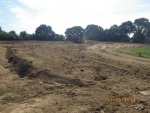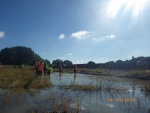Case study:Firs Farm Wetlands: Difference between revisions
Jump to navigation
Jump to search
No edit summary |
No edit summary |
||
| (13 intermediate revisions by 2 users not shown) | |||
| Line 6: | Line 6: | ||
}} | }} | ||
{{Project overview | {{Project overview | ||
|Status=In progress | |Status=In progress | ||
|Themes=Environmental flows and water resources, Flood risk management, Habitat and biodiversity, Monitoring, Social benefits, Water quality, Urban | |Themes=Environmental flows and water resources, Flood risk management, Habitat and biodiversity, Monitoring, Social benefits, Water quality, Urban | ||
| Line 14: | Line 13: | ||
|Contact organisation=London Borough of Enfield | |Contact organisation=London Borough of Enfield | ||
|Contact organisation url=enfield.gov.uk/ | |Contact organisation url=enfield.gov.uk/ | ||
|Partner organisations=Environment Agency, Thames Water, Greater London Authority, Thames 21, Friends of Firs Farm | |||
|Name of parent multi-site project=Case_study:Rewilding Enfield's Urban Rivers | |||
|Multi-site=No | |Multi-site=No | ||
}} | }} | ||
{{Image gallery}} | {{Image gallery}} | ||
{{Case study image | |||
|File name=FF Before Works.JPG | |||
}} | |||
{{Case study image | |||
|File name=FF Construction.JPG | |||
}} | |||
{{Case study image | |||
|File name=FF Channel Construction.JPG | |||
}} | |||
{{Case study image | |||
|File name=FF Wetlands Construction.JPG | |||
}} | |||
{{Case study image | |||
|File name=FF Planting Event.JPG | |||
}} | |||
{{Case study image | |||
|File name=FF Planted Wetlands.JPG | |||
}} | |||
{{Case study image | |||
|File name=FF Pond and Channel.JPG | |||
}} | |||
{{Image gallery end}} | {{Image gallery end}} | ||
{{Toggle button}} | {{Toggle button}} | ||
| Line 23: | Line 45: | ||
|Subcatchment=Pymmes Brook (Salmons Brook to Lee, includes Part of Lee Navigation B) | |Subcatchment=Pymmes Brook (Salmons Brook to Lee, includes Part of Lee Navigation B) | ||
}} | }} | ||
{{Site}} | {{Site | ||
|Name=Firs Farm Wetlands | |||
|WFD water body code=UKGB106038027910, | |||
|WFD water body name=Pymmes Brook (Salmons Brook to Lee, includes Part of Lee Navigation B) | |||
|Pre-project morphology=Closed culvert, | |||
|Heavily modified water body=Yes | |||
|Protected species present=No | |||
|Invasive species present=No | |||
|Dominant hydrology=Surface Water Runoff, fluvial | |||
|Dominant substrate=Clay, Gravel, | |||
|River corridor land use=Parklands, Grassland, | |||
}} | |||
{{Project background}} | {{Project background}} | ||
{{Motivations}} | {{Motivations | ||
{{Measures}} | |Specific mitigation=Flood risk management, Poor Water Quality | ||
|Hydromorphological quality elements=Quantity & dynamics of flow, | |||
|Physico-chemical quality elements=Oxygen balance, Nutrient concentrations, PH, Biological Oxygen Demand, Total Suspended Solids, Heavy Metals, Hydrocarbons | |||
|Other motivation=Improve Public Space, Improve Linkages, Improve Health and Wellbeing of local park users | |||
}} | |||
{{Measures | |||
|Bank and bed modifications measure=Deculverting, Ponds and pools inside the wetland | |||
|Floodplain / River corridor=Creation of wetland, Creation of wet woodland, Creation of pond, Creation of side channel, Deculverting, Extensive planting, Sustainable urban drainage ponds (SUDs), Floodplain creation, | |||
|Social measures=Public amenity and perception, Community involvement, Community Education, Engagement with schools, | |||
}} | |||
{{Hydromorphological quality elements header}} | {{Hydromorphological quality elements header}} | ||
{{End table}} | {{End table}} | ||
Latest revision as of 14:42, 5 June 2017
This case study is pending approval by a RiverWiki administrator.
Location: 51° 37' 41.59" N, 0° 5' 12.88" W
Left click to look around in the map, and use the wheel of your mouse to zoom in and out.
Project overview
| Status | In progress |
|---|---|
| Project web site | |
| Themes | Environmental flows and water resources, Flood risk management, Habitat and biodiversity, Monitoring, Social benefits, Water quality, Urban |
| Country | England |
| Main contact forename | Ian |
| Main contact surname | Russell |
| Main contact user ID | |
| Contact organisation | London Borough of Enfield |
| Contact organisation web site | http://enfield.gov.uk/ |
| Partner organisations | Environment Agency, Thames Water, Greater London Authority, Thames 21, Friends of Firs Farm |
| Parent multi-site project | |
| This is a parent project encompassing the following projects |
No |
This case study hasn’t got a picture, you can add one by editing the project overview.
Project summary
This case study hasn’t got any project summary, you can add some by editing the project overview.
Monitoring surveys and results
This case study hasn’t got any Monitoring survey and results, you can add some by editing the project overview.
Lessons learnt
This case study hasn’t got any lessons learnt, you can add some by editing the project overview.
Image gallery
|
Catchment and subcatchmentSelect a catchment/subcatchment
Catchment
Subcatchment
Other case studies in this subcatchment: Pymmes Park Wetlands
Site
Project background
Cost for project phases
Reasons for river restoration
Measures
MonitoringHydromorphological quality elements
Biological quality elements
Physico-chemical quality elements
Any other monitoring, e.g. social, economic
Monitoring documents
Additional documents and videos
Additional links and references
Supplementary InformationEdit Supplementary Information
| ||||||||||||||||||||||||||||||||||||||||||||||||||||||||||||||||||||||||||||||||||||||||||||||||||||||||||||||||||||||||||||||||||||||||||||||||||||||||||||||||||||||||||||||||||||||||||||||



